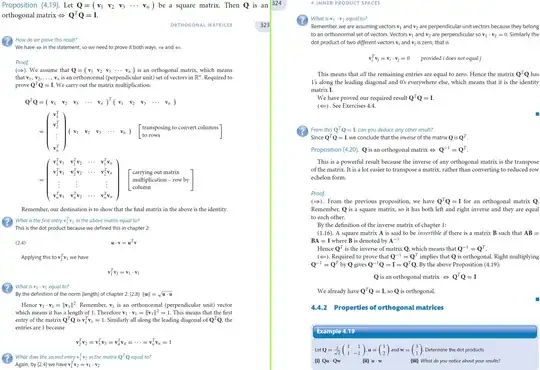Let the matrix $M$ be an $n \times n$ matrix with components
$$M =\begin{pmatrix} v_1 & v_2 & \cdots &v_n \end{pmatrix}$$
where $v_i$ is the $i$th column vector with $n$ components.
Now, consider $M \times M$
$$M^T \times M =
\begin{pmatrix} v_1 \\ v_2 \\ \vdots \\v_n \end{pmatrix}
\times
\begin{pmatrix} v_1 & v_2 & \cdots &v_n \end{pmatrix} \\
= \begin{pmatrix}
v_1 \cdot v_1 & v_1 \cdot v_2 & \ldots &v_1 \cdot v_n \\
v_2 \cdot v_1 & v_2 \cdot v_2 & \ldots &v_2 \cdot v_n \\
v_3 \cdot v_1 & v_3 \cdot v_2 & \ldots &v_2 \cdot v_n \\
\vdots& \vdots & \ddots &\vdots \\
v_n \cdot v_1 & v_n \cdot v_2 & \ldots &v_n \cdot v_n
\end{pmatrix}$$
However, remember that since the vectors $v_i$ that form the matrix $M$ are pairwise orthogonal,
$$v_i \cdot v_j = 1 \ \text{if} \ i = j \\
v_i \cdot v_j = 0 \ \text{if} \ i \neq j
$$
Using this to simplify the matrix product,
$$M^T \times M =
\begin{pmatrix}
1 & 0 & 0 & \cdots & 0 \\
0 & 1 & 0 & \cdots & 0 \\
0 & 0 & 1 &\cdots & 0 \\
\vdots & \vdots & \vdots &\ddots & \vdots \\
0 & 0 & 0 & \cdots & 1
\end{pmatrix}
= I
$$
